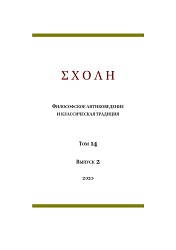Письмо №33 Михаила Пселла: философское объяснение благоухания умерших тел
Michel Psellos’ Letter no. 33: Philosophical Explanation for the Odor of Sanctity
Author(s): Andrey Kurbanov, Lydia SpyridonovaSubject(s): Metaphysics, Ancient Philosphy, Existentialism, Ontology
Published by: Новосибирский государственный университет
Keywords: Michael Psellos; John Mauropous; Phaedon; Timaeus; soul; logos spermatikos; Odor of Sanctity; myrrh; ether;
Summary/Abstract: This article proposes a commentary and a Russian translation of Letter KD 33, written by the Byzantine philosopher Michael Psellos to his friend John Mauropous. Both correspondents were among the most prominent figures of the revival of Platonism in the 11th century. Their writings provide a notable example of the adaptation of Platonic philosophy to Byzantine needs. The letter was sent after a sorrowful event — the death of Mauropous’ brother, whose corpse, however, started to exude a sweet floral fragrance. Psellos argues that the “odor of sanctity” proceeds from the soul, which has received a divine myrrh, emanating from God. But how could it be that this supernatural aroma proceeds even after the soul’s departure? The author suggests that the human body par-takes not only of the earthly primary substances, but also of the ether, which is involved in forming the man’s logos. During the process of dissolution between soul and body, the intellectual fire burns the earthly substances of blood out, whereas its heavenly substance continues to remain. This ethereal essence, retaining the sweet-smelling aroma of the soul, exhales it around after the physical death.
Journal: ΣΧΟΛΗ. Философское антиковедение и классическая традиция
- Issue Year: XIV/2020
- Issue No: 2
- Page Range: 826-840
- Page Count: 15
- Language: Russian

